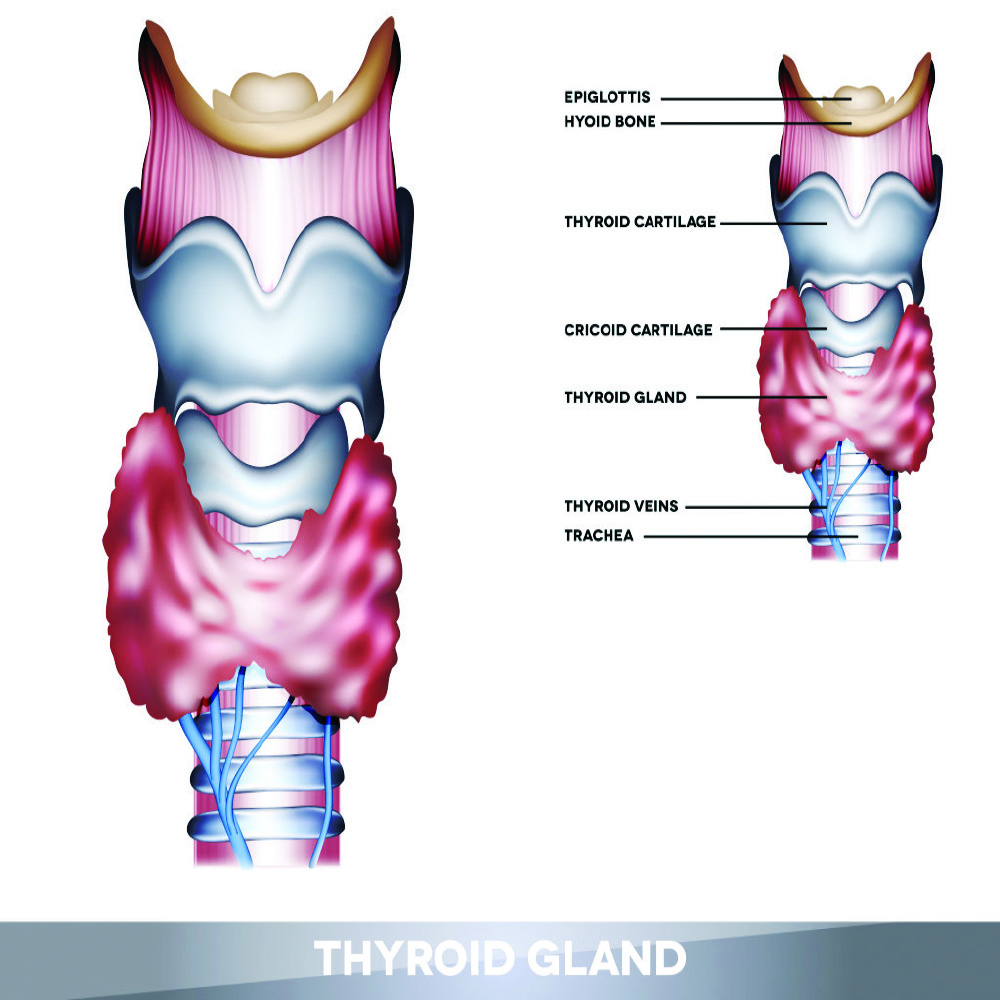The thyroid gland is located just in front of the voice box, in the neck. It produces two hormones, Thyroxine (T4) and Triiodothyronine (T3). These hormones are essential for proper cell development, for heat production and to maintain metabolism in the body. Production of thyroid hormones is controlled by hormones produced by the pituitary (Thyroid Stimulating Hormone or TSH) and hypothalamus (Thyrotrophin Releasing Hormone or TRH), both of which are located in the brain.
Diseases of the thyroid can result from abnormal hormone (T3 and T4) production, or in swellings in the gland, which may be benign (not cancerous) or malignant (cancerous). Abnormal hormone production may be excessive production (hyperthyroidism) or reduced production (hypothyroidism). Thyroid swellings may be single or multiple.
Diseases of Hormone Production
Hypothyroidism (low thyroid hormone production) can even affect newborn babies (this condition occurs in 1 in 4000 births). Most of these babies appear normal. If undetected and untreated, they may develop permanent neurological damage and mental retardation. To prevent this from happening, hospitals perform routine blood tests for all new born babies. If babies do suffer from hypothyroidism, they will require life-long thyroid hormone replacement therapy.
Hypothyroidism affecting adults are mostly due to auto-immune conditions (whereby the body produces anti-bodies that damage and destroy their own thyroid gland, resulting in reduced or no thyroid hormone production). Another cause is, the result of thyroid surgery (whereby too much of the thyroid gland has been removed.)
Some features of this condition are tiredness, weakness, dry skin, feeling cold, hair loss, poor concentration and memory, constipation, weight gain with poor appetite, breathing problems, hoarse voice, heavy periods in women and numbness. A goitre (thyroid swelling) may or may not be present. This condition is confirmed by blood tests. Treatment with thyroid hormones is life long.
Hyperthyroidism (high thyroid hormone production) affects more women than men. Features include increased activity (jitteriness), irritability, sweating, heat intolerance, palpitations, fatigue, weight loss with increased appetite, diarrhoea, decrease periods in women, neck swelling or protruding eyes. This condition is also confirmed with blood tests. Three forms of treatment are available. Most commonly thyroid medicines are prescribed for a duration of 18 to 24 months. Most people are cured after this period. Some however do get a relapse. They will require another course of medicines or alternative treatment.
Surgical removal of part of the thyroid gland is another option. The surgeon will leave behind part of the gland so that it will produce sufficient, but not excessive amounts of hormone. Side effects of surgery are, voice change (due to nerve damage during surgery) and muscle cramps (due to low calcium due to removal of the nearby parathyroid gland).
Radioactive Iodine is sometimes used. The solution of radioiodine when swallowed is absorbed and selectively concentrated in the thyroid gland, and over a period of time gradually destroys excessive thyroid tissue, leaving behind enough thyroid tissue to produce sufficient amounts of hormone for the person’s needs. This is an uncommon method of treatment in Malaysia, and is used only in older patients
Thyroid Swellings
Thyroid swellings may be diffuse (the whole gland being uniformly enlarged) or discrete (producing lumps). Thyroid lumps may be single or multiple. These are either cystic (soft with fluid inside) or nodular (fleshy). Most are benign (not cancerous) but some are malignant (cancerous). The commonest test done for thyroid swellings is Ultrasound (this can show if the swelling is cystic or nodular. Cysts usually are not cancerous. To detect if a swelling is cancerous a Fine Needle Aspirate Cytology test (FNAC) is done. The surgeon inserts a small needle into the lump and sucks out a small amount of tissue to be examined in the lab. The cells are examined in the lab for cancer, and if so, operation is recommended.
In summary, thyroid disease are not uncommon. In the new born routine blood tests have enabled early detection of hypothyroidism, and with treatment have prevented cretinism. In adults a simple examination by your GP together with easily available blood tests can detect thyroid disease. Routine medical check up with your GP (especially if you are over 40 years) can help detect thyroid disease, and many other diseases in the early stage.

















